Difficulties in tea and coffee farming leaves bitter taste in Nakuru farmers' mouths
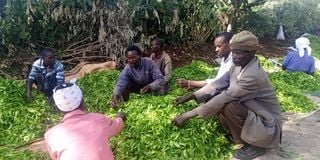
Farmers sort their tea leaves in Kabazi before loading them into a lorry for sale in Limuru on August 14, 2023.
As we drive through Bahati sub-county along the Kabazi stretch, I am amazed by the lush green tea estate and even more, by the coffee being grown in this area.
Unknown to many, Bahati and Subukia have a pool of farmers actively growing both crops. Though the majority do it on a small scale, there are a few tea estates spanning up to 70 acres and more.
A good number of small-scale tea farmers say they have put in the effort to sustain these crops, despite the hardships they experience.
According to Boniface Muritu from Maombi Farms in Kabazi, residents here have practised tea farming since the 1980s, after their parents inherited land, earlier occupied by white settlers.
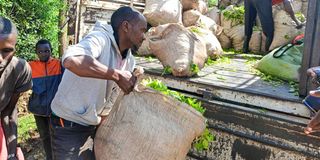
Boniface Muritu, Maombi tea owner loading tea on a lorry before it is transported to Limuru on August 14, 2023.
From then, tea farms were passed on to the younger generation after the parents passed on or retired from farming because of old age.
Muritu now manages a two-and-a-half-acre tea farm in Kabazi, one that he took up from his parents.
“Growing up, we would take our tea to a factory nearby which largely served locals from this region. However, the factory’s relationship with farmers deteriorated as it continued buying the farmer’s produce at a low rate, and delaying their payments and bonuses,” says Muritu.
He discloses that in search of better pay for their produce, they have been forced to transport their tea all the way to Limuru's Brooke Tea factory.
“It is disheartening that we pick our tea in Nakuru county and transport it to Kiambu county just to get favourable pay for our produce, yet we have a tea factory close to us,” he says in a sad tone.
Moris Ouma collects tea from the farmers around Kabazi every evening and transports it to Limuru where it is processed.
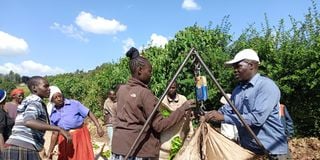
Moris Ouma weighing tea picked by farmers from Kabazi before taking it to a factory in Limuru on August 14, 2023.
He says that the quality of tea growing in this region is of good quality and can compete in the market with tea grown in active tea regions like Kiambu, among other areas.
Another farmer, Sospeter Macharia, says he inherited the tea farm from his parents after they passed on. For 20 years he has been actively involved in the tea industry.
“Growing tea is costly. We have to pay the trucks coming from Limuru to pick up our tea, the farm workers, and buy fertilizers. With all these expenses, the farmer earns very little from this crop,” says Macharia.
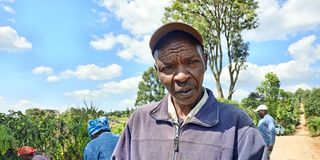
Sospeter Macharia a tea farmer from Kabazi has an acre of tea which he inherited from his parents when they passed on.
His plea to the national and county government is for them to provide subsidized fertilizer for tea farmers.
On the other hand, coffee farmers in this region seem to be experiencing better days as compared to tea farmers.
An average of 400 farmers grow coffee in this region both on large and small scale.
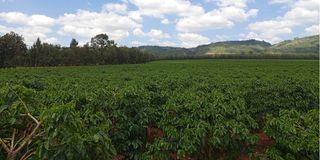
Coffee plantation in Solai.
Mtaa Wangu speaks to Joseph Ngugi from Bahati, who has an average of 20 acres put into coffee farming.
Just like tea, coffee was also introduced in this region pre-independence.
Ngugi however says that small-scale farming came about five years ago, when former President Uhuru Kenyatta, promised to improve the pay for coffee farmers.
“Many of us rushed to coffee farming in 2017 hoping to reap big rewards from the crop. I got into this in 2018,” he recalls.
Related: The first farmers of Nakuru County
According to him, coffee farming had been performing well for farmers until this year, when the payment had a drastic drop.
“In 2021, a kilogram of coffee beans would go for Sh 87 while this year it declined to Sh 54,” says Ngugi.
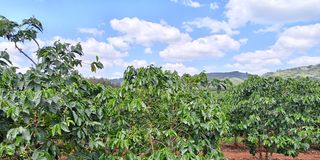
Coffee farmers in Bahati earn up to Sh 250,000 each harvesting season.
He happily shares that he earns an average of Sh 250,000 each season.
“As for processing our produce, most of our harvest is taken to Mutungati Co-operative between November 1 and December 10 yearly. Beyond this, the cooperative does not accept any coffee beans. I therefore do value addition on my coffee beans and sell them locally,” he adds.
